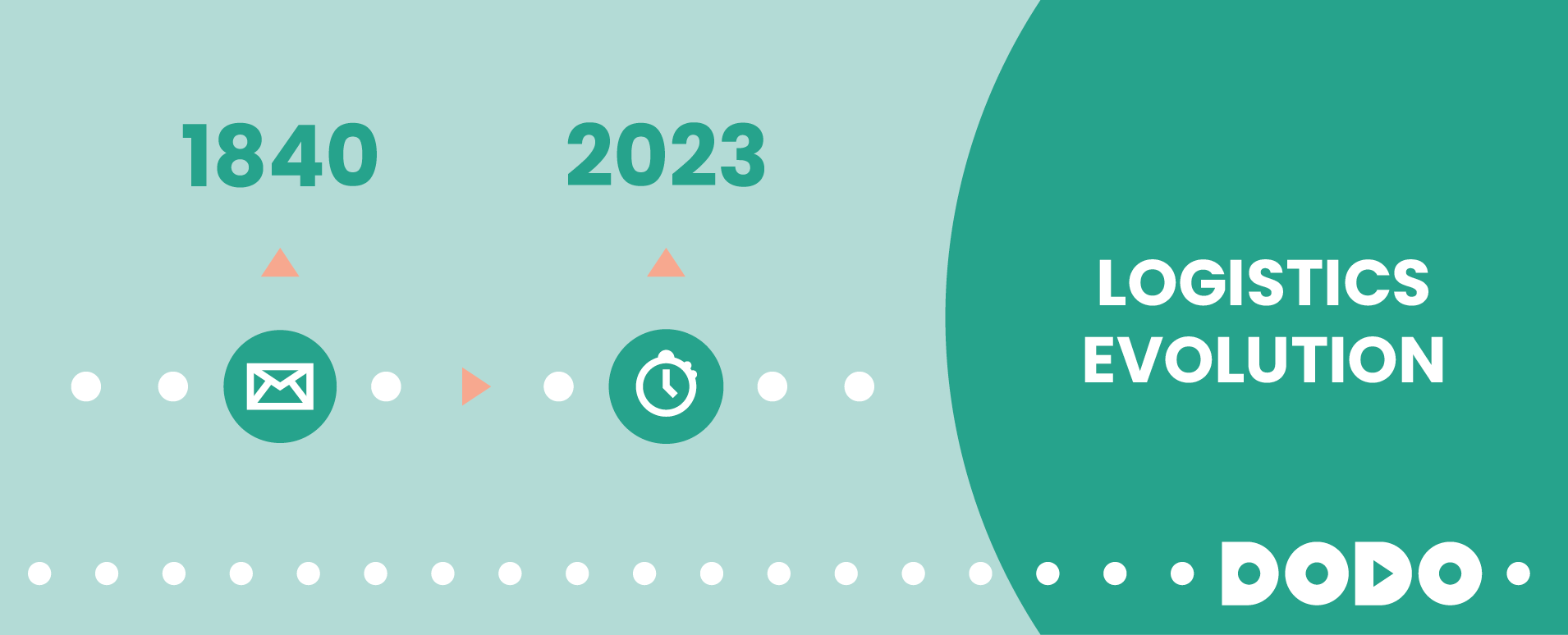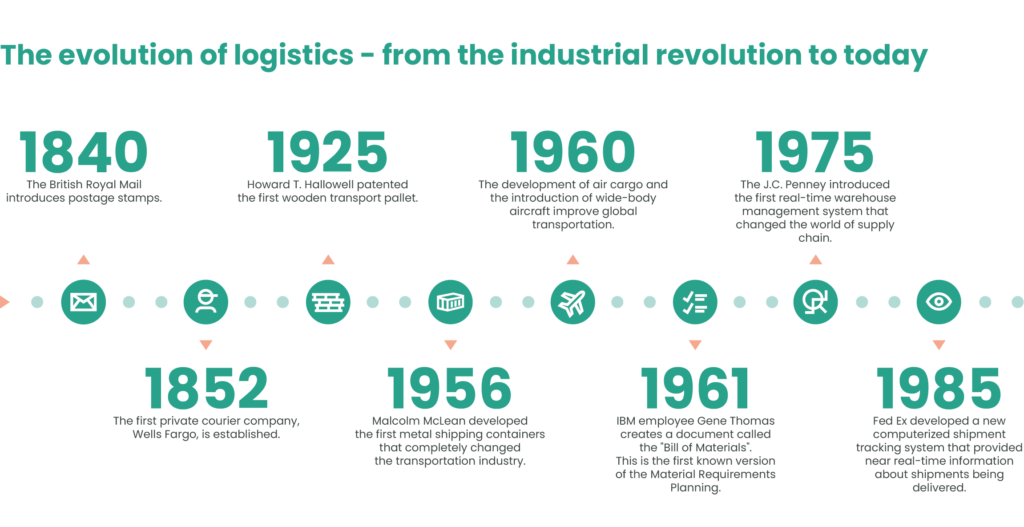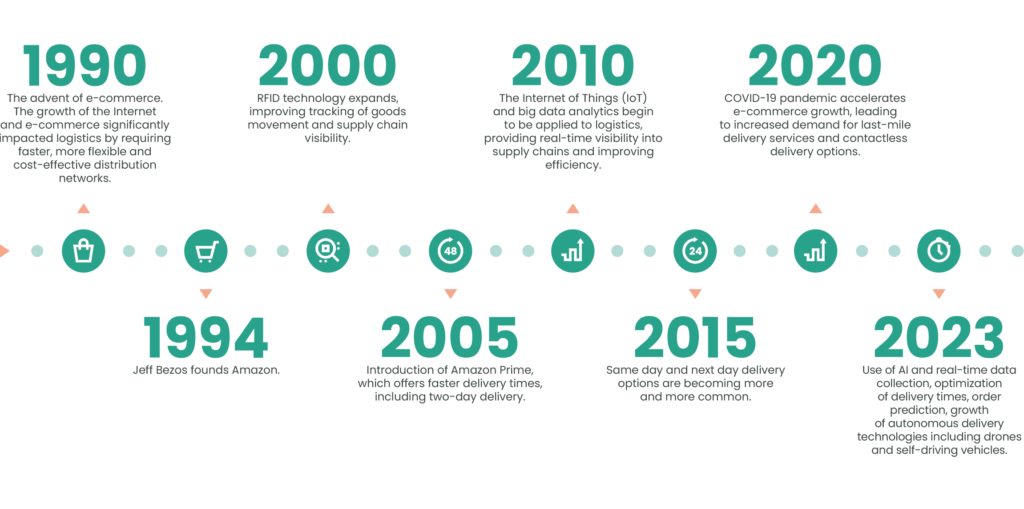The evolution of logistics: from the Silk Road to artificial intelligence and robots

Logistics has undergone a remarkable evolution over the centuries. What started as basic transportation and storage practices has transformed into a complex technological field that plays a vital role in today’s economy. Join us as we take a look at the evolution of logistics over the years as well as the current trends and the future. The use of automation and artificial intelligence will also be explored.

The origins of logistics at sea and on land
The roots of logistics go back to ancient civilizations. The Phoenicians, Egyptians and Greeks were among the first to establish sea trade routes for the exchange of goods. They also formulated the basic principles of maritime transport, including navigation techniques and cargo handling.
The first trade routes linking Europe and Asia were also established at the same time. One of the most well-known – the Silk Road – was established more than two thousand years ago. This complex network of trade routes linking East and West demonstrated the early principles of logistics. Caravans and draft animals carried valuable cargo, while stops and inns provided rest and protection for travelers.
The Industrial Revolution: full steam ahead
The Industrial Revolution was a key period for logistics as we know it today. The rise of steam transport and the development of factories led to mass production and the need for efficient distribution networks. The railway became the main mode of transport, making it possible to transport goods over long distances and speed up their delivery. With the completion of the rail connection between the East and West coasts of the USA, the delivery time was reduced from several months to 7 days.
It was also during this period that the first private courier service was established in America, which differed from the post office in particular in terms of speed and guaranteed delivery by a certain date and time.
The 20th century: streamlining and new technologies
The great logistics boom came at the beginning of the 20th century with the arrival of the first cars. These replaced the original horse-drawn carriages and made local delivery more efficient. Shipments could be delivered to places where railways could not reach.
Postal machines also saw the light of day, allowing people to send parcels 24 hours a day. Some cities, such as Paris and New York, even built pipe mail systems that used pressurized pipes to speed up shipping.
Thanks to the development of aviation after World War II, air transportation became a common part of logistics for transporting large numbers of shipments over long distances. On the ground, American truck driver Malcolm McLean developed the first metal shipping containers in 1956. These completely changed the transport industry and are still a cornerstone of modern logistics today.
The 1960s brought the expansion of trucking and the integration of computer technology. IBM replaced manual data entry on paper and created the first glimpse of what the future of logistics systems would look like.
“The rise of computers and the development of data processing systems was a fundamental shift in the way logistics was perceived at the time. Computer systems developed in the 1960s and 1970s by IBM provided tools for inventory management, route optimization, shipment tracking, and facilitated the coordination of logistics operations. The development of geographic information systems and specialized software helped to optimize shipping routes and increase the efficiency of deliveries” adds Martin Marek, Group COO of techno-logistics company DODO.
In 1975, the former Logisticon company created the first computerized warehouse management system. This WMS was first used by retail company J.C. Penney, effectively launching the modern era of warehouse management. Through the WMS, logistics managers could track orders, monitor inventory, and oversee distribution. Again, this is something we take for granted today, but at the time, it represented a huge advance. In addition, the 1970s also brought the invention of the barcode, which made it much easier to identify packages.
The turn of the millennium: the rise of e-commerce
The digital era has transformed logistics to a new level. The rise of computers and the internet has enabled better communication, real-time tracking of shipments, and more efficient data management. The huge boom of the internet and its impact on e-commerce have caused major changes in logistics.
“The launch of companies like Amazon and Alibaba has changed consumer expectations of delivery and created a demand for faster, more accurate, and more cost-effective logistics solutions. The number of small parcels has increased, and new delivery methods such as next day or same day delivery have emerged. Real-time tracking and monitoring systems have enabled logistics companies to manage their inventory more efficiently, and big data analytics tools have helped optimize supply chain operations and reduce costs. Many companies have begun to outsource their logistics operations to third-party logistics providers (3PLs). This has allowed companies to focus on their core competencies while relying on logistics experts to provide efficient supply chain management,” explains Martin Marek.
Large companies like Amazon have also started to launch the first so-called fulfillment centers. These huge, often highly automated warehouses have made order processing more efficient and reduced the time between placing an order and receiving the shipment. Conveyor systems, automated storage and retrieval systems (AS/RS) and optimized inventory management have played a significant role in increasing the speed and accuracy of e-commerce logistics.
The 21st century: last mile delivery and new technologies
Since 2010, last-mile logistics, the last part of the journey from the distribution center to the customer, has reached the forefront. Companies were looking for innovative solutions to make delivery more efficient and cheaper while delivering goods in the shortest possible time. The rise of technology platforms for ordering and delivering food, such as DoorDash or Uber Eats, has brought workers in the sharing economy into the picture. These have offered fast and flexible delivery options, which have also impacted e-shops. In fact, customers have started demanding same or next day delivery.
“Modern logistics companies are currently using advanced technology and real-time data collection to optimize delivery time, transport, fuel efficiency, or courier utilization. This makes it much easier for companies to deliver goods and reduces the negative impact on the urban environment. If a logistics company can plan a route correctly, maximize the load on the vehicle that is travelling along it, and, thanks to good communication with the customer, deliver all shipments on schedule and without delays, logistics can be done sustainably,” adds Martin Marek.

The future of logistics: artificial intelligence
Technological innovations in automation, artificial intelligence (AI) and data analytics will play a crucial role in the future of logistics. The main goals of implementing AI are to increase efficiency and reduce transport costs, taking into account the environment and the complicated traffic situation in the city.
DODO is one of the pioneers of modern technology in logistics. We have developed our own GAIA platform for this purpose. It analyzes huge amounts of data to optimize all processes and maximize fleet capacity.
We have also recently launched a pilot run of the so-called order predictor. This technology can use AI to predict customer orders and their approximate destinations two weeks in advance, down to specific hours. Other technological innovations include dynamic pricing of the delivery service, which allows demand to be optimally spread throughout the day to reduce traffic during peak periods.
More and more logistics companies are also utilizing robots and drones. Robots are being used to automate tasks such as picking, packing, and dispatching in warehouses, while the introduction of drones may impact the future of delivering shipments to customers or transporting goods between warehouses and distribution centers.
If you are looking for a reliable partner in last mile logistics, please do not hesitate to contact us. We look forward to working with you and to many more successful projects with our clients.
